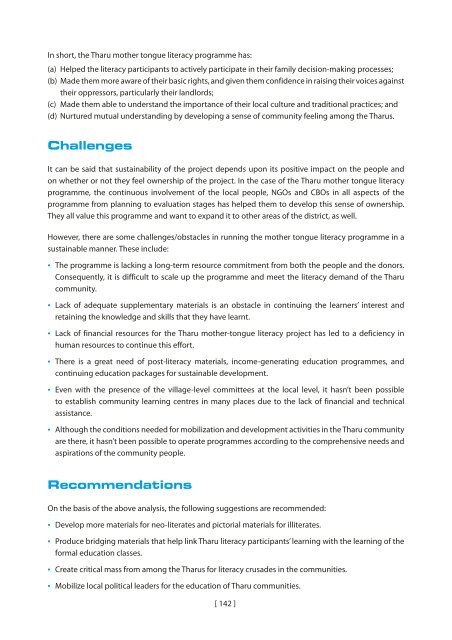Mother Tongue-based Literacy Programmes: Case Studies of Good ...
Mother Tongue-based Literacy Programmes: Case Studies of Good ...
Mother Tongue-based Literacy Programmes: Case Studies of Good ...
You also want an ePaper? Increase the reach of your titles
YUMPU automatically turns print PDFs into web optimized ePapers that Google loves.
In short, the Tharu mother tongue literacy programme has:(a) Helped the literacy participants to actively participate in their family decision-making processes;(b) Made them more aware <strong>of</strong> their basic rights, and given them confidence in raising their voices againsttheir oppressors, particularly their landlords;(c) Made them able to understand the importance <strong>of</strong> their local culture and traditional practices; and(d) Nurtured mutual understanding by developing a sense <strong>of</strong> community feeling among the Tharus.ChallengesIt can be said that sustainability <strong>of</strong> the project depends upon its positive impact on the people andon whether or not they feel ownership <strong>of</strong> the project. In the case <strong>of</strong> the Tharu mother tongue literacyprogramme, the continuous involvement <strong>of</strong> the local people, NGOs and CBOs in all aspects <strong>of</strong> theprogramme from planning to evaluation stages has helped them to develop this sense <strong>of</strong> ownership.They all value this programme and want to expand it to other areas <strong>of</strong> the district, as well.However, there are some challenges/obstacles in running the mother tongue literacy programme in asustainable manner. These include:• The programme is lacking a long-term resource commitment from both the people and the donors.Consequently, it is difficult to scale up the programme and meet the literacy demand <strong>of</strong> the Tharucommunity.• Lack <strong>of</strong> adequate supplementary materials is an obstacle in continuing the learners’ interest andretaining the knowledge and skills that they have learnt.•Lack <strong>of</strong> financial resources for the Tharu mother-tongue literacy project has led to a deficiency inhuman resources to continue this effort.• There is a great need <strong>of</strong> post-literacy materials, income-generating education programmes, andcontinuing education packages for sustainable development.•Even with the presence <strong>of</strong> the village-level committees at the local level, it hasn’t been possibleto establish community learning centres in many places due to the lack <strong>of</strong> financial and technicalassistance.• Although the conditions needed for mobilization and development activities in the Tharu communityare there, it hasn’t been possible to operate programmes according to the comprehensive needs andaspirations <strong>of</strong> the community people.RecommendationsOn the basis <strong>of</strong> the above analysis, the following suggestions are recommended:• Develop more materials for neo-literates and pictorial materials for illiterates.•Produce bridging materials that help link Tharu literacy participants’ learning with the learning <strong>of</strong> theformal education classes.• Create critical mass from among the Tharus for literacy crusades in the communities.• Mobilize local political leaders for the education <strong>of</strong> Tharu communities.[ 142 ]

















